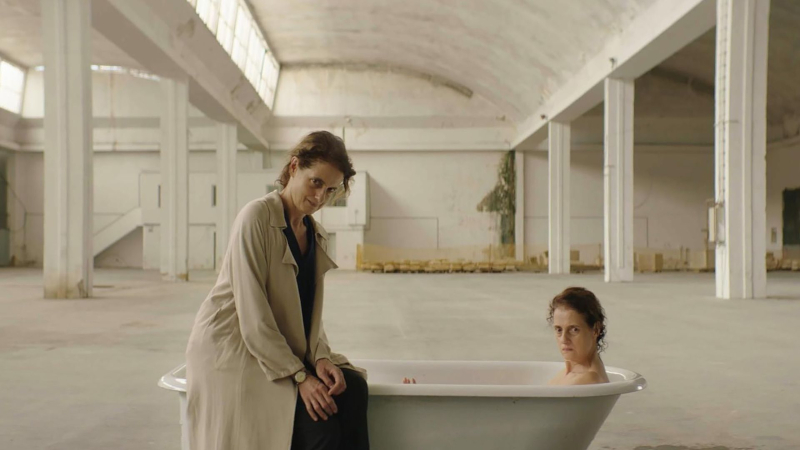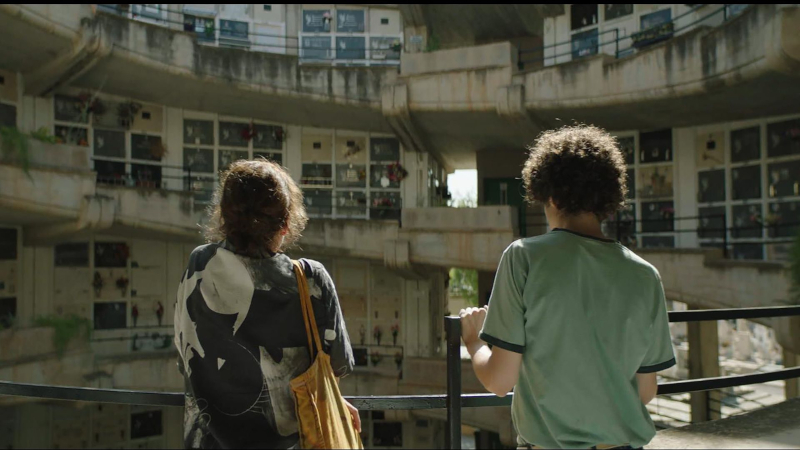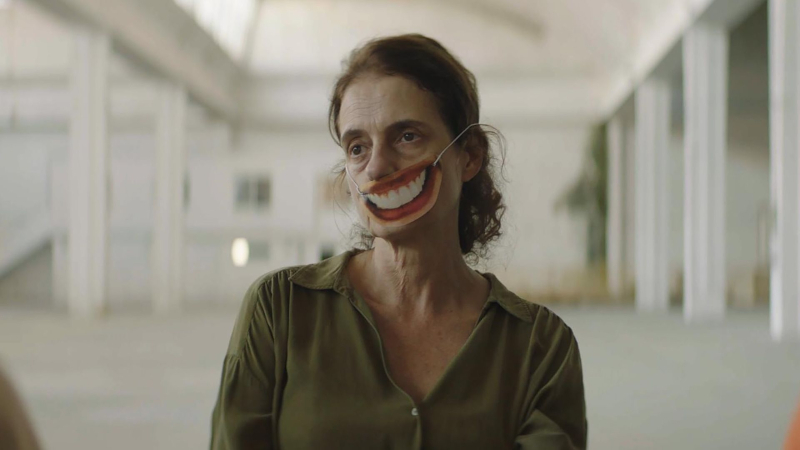Director – Paolo Marinou-Blanco – 2024 – Portugal, Brazil, Spain – 85m
****
A woman diagnosed with terminal cancer signs up with a corporate programme allegedly aimed at helping people in her situation to humanely end their own lives – premieres in the Critics’ Picks Competition of the 28th Tallinn Black Nights Film Festival
“Chemo never worked. So I decided to beat the fucker to the punch.” Thus says Gilda (Denise Fraga) at the start of this tale about voluntary euthanasia. Gilda has cancer and a year and a half left to live. She exasperates her husband when he hilariously stumbles into the bathroom as she’s trying to shoot herself in the head, both of them winding up in hospital as a result.
She is determined to kill herself. If she does nothing, the condition will take its course and the end of the process won’t be pleasant. In the hospital, she picks up a leaflet of a company which might provide some help for those considering voluntary euthanasia. So Gildagoes for an interview with Joy Transition International and finds herself facing a panel of three: Isa (Joana Rebeiro), Eva (Sandra Faleiro), and Bruno (Alexander Tuji Nam).
Isa has her mouth fixed in a somewhat ingratiating, permanently lipstick-painted smile. Eva, who seems to be running the show, is the corporate executive type. Bruno is the type one can imagine as a flight attendant demonstrating what to do if the plane crashes. All three have a corporate gloss about them: it’s all about selling the gig or the product because that’s what they have to do for a living.
It’s not clear, at least initially, how much any of these three actually believe in the programme they’re selling. Isa’s constant smile turns her face into an impenetrable mask. Eva, one would guess, believes in it as a moneymaking enterprise (Gilda thinks it’s basically a scam), but whether she also believes in it as some sort of genuinely valuable service to humanity – who knows? The market is God. Bruno has about him something of the hapless minion (when I wrote those words, I wasn’t thinking of the ever-popular children’s cartoon characters, but, actually, that fits – witness the hilarious scene where he demonstrates to the clients how to kill yourself with a plastic bag, an elastic band and a pair of handcuffs, then gestures frantically for help as he nearly, inadvertently, succeeds).

These three characters, however entertaining, jaw-dropping or horrific, are very much the sideshow to Gilda’s main event. We see her detail the outstanding two of her three prior suicide attempts, a nice little sequence where she sits on the edge of a bath in which a second her also sits, placed in the corporate warehouse site as a figment of her imagination so she can tell us the story, of slitting her wrist with a DIY cutting tool and later dropping an electrical appliance into the water, which “rarely works”. (This sequence is probably accomplished via straightforward split screen, but you’re so emotionally involved with the character at this point that you don’t see the join or wonder how it was done.)
Another key moment from Gilda’s past involves as a child visiting her father in hospital as he is dying of pancreatic cancer with three visiting relatives at his bedside – a military uncle who thinks he should, “buck up, man”, an overly religious Catholic aunt who exhorts prayer to the Blessed Virgin Mary, and a third busy eating the edible treats she bought for the patient. At this point, Gilda realised that death was not about the dying person, but about helping the living to cope with the situation.
Eventually, Joy Transition International’s sessions get around to their buddy system. Gilda finds herself paired with Amadeu (João Nunes Monteiro), who turns out to be obsessed with death. His dream job is related to his obsession: he is a mortuary attendant. He likes being with recently dead people, talking to them. They talk back to him. This is strangely unsettling to watch: at first, you think he’s talking to a live people lying on a slab as if for a consultation about their diagnosis, as if he were a doctor. Yet he’s a living mortuary assistant, and they are dead.
One dead woman he talks to likes the idea of things going wrong at her funeral to upset their complacency. (I am reminded of the brilliant Netflix documentary Dick Johnson is Dead, (Kirsten Johnson, 2020), wherein the director makes a film about her dad’s inevitable future death, filming his possible deaths and staging his funeral service ahead of time.)
Slowly, Gilda and Amadeu two will come to like each other. Perhaps, before the end, they might even fall in love. Whatever, both are determined to see their attempted suicides through, even attempting a raid on an animal welfare clinic in an attempt to get Sodium Pentobarbital, a drug used for the euthanasia of animals. When a noise wakens the on-premises security guard, the pair suddenly find themselves all over each other in a store cupboard before fleeing.
As Gilda becomes increasingly disenchanted with Joy Transition International, she and Amadeu find themselves talking alone with Isa, who basically agrees with them that the company programme they are undertaking is complete bullshit. She has an alternative though: a doctor in Mallorca who, for a fee, will offer and enable assisted suicide. It looks exactly what Gilda is after: she and Amadeu decide to go for it, travelling to Mallorca to meet a lady doctor named Montse (Assun Planas)…

Death is one of the great contemporary taboos. Sex, in all its variations, we talk about a lot. Death, personal death, our own death, our own dying, not so much. This film, however, plunges straight in at the start with Gilda’s double shooting and isn’t afraid to confront this difficult issue.
It is filmed with a bizarre mise-en-scène wherein Gilda is like a TV programme presenter, walking through scenes of her life, an approach which sits uneasily with the usual conventions of narrative film where people play characters within the framework of a story. Part of my mind wants to tell you this can’t possibly work, yet somehow director Marinou-Blanco and actress Denise Fraga achieve the impossible and make the device not only work, but also act as the perfect vehicle for confronting and articulating thoughts about a subject all too often considered taboo.
In passing, the piece takes effective pot-shots at both the exploitation of people for profit – perhaps we should simply name it as capitalism – and the positive-thinking, self-help industry. Nowhere is this more aptly satirised here than in the scene where all those enrolled on the Joy Transition International programme are required to put smiling mouth masks over their faces, creating an audience of fixedly smiling, perpetually happy people. As has recently been said elsewhere in the movies, “put on a happy face”. It’s an image at once which encapsulates our subservience and conformism towards corporate culture and our widespread cultural refusal to confront the inevitable fact of own death.
It’s a film this writer has struggled with in terms of star ratings, something I can usually pin down pretty fast after seeing a film. Immediately after I saw it, I thought, maybe two and a half stars. But the movie has been marinating in my head all week. It crept up to three stars. And then, as I thought about it more, and went back and rewatched it, it grew to a four. I’m not sure it won’t go higher in my head in the coming weeks and months. At the time of writing – critics’ deadlines are a terrible thing – it’s a four.
It’s also a film that will, I think, repay revisiting over the coming years. There are films you watch once and never watch again. There are others that, in time, you will want to return to and revisit when you’re ready. This is one of the latter, and I hope that its screening at this year’s PÖFF helps it find the wider international distribution it most definitely deserves.
Dreaming of Lions premieres in the Critics’ Picks Competition of the 28th Tallinn Black Nights Film Festival which runs in cinemas from Friday, November 8th to Sunday, November 24th 2024.
This review originally appeared on DMovies.org: you can find it here.
Trailer:
